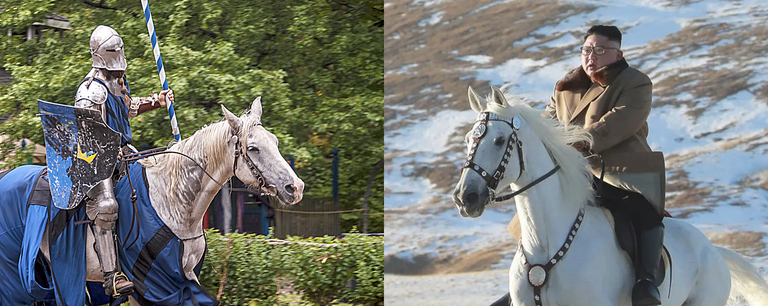
Left: Blue knight on white horse at the 2019 Kansas City Renaissance Festival (credit: JoLynne Walz Martinez). Right: Kim Jong-Un on a white horse (credit: Korean Central News Agency). Click for a higher-resolution version.
[This post was originally published on Cohost.]
A recent post by @Halceon reinforced a thought I had while writing my post about magic: that the desire to read stories about people who seemingly have personal agency, and are not working as part of a faceless bureaucracy or corporation, is a major factor in the popularity of anime, manga, and light novels about magic, especially those set in pseudo-European, sort-of-medieval settings populated by monarchs and nobles. (As a matter of fact, I just finished reading one of them myself.)
In such works monarchs and nobles are often portrayed as essentially benign overseers of society; even those that purport to comment on the gap between commoners and the nobility will typically feature one or more examples of “good kings” or “parfit gentil knyghts.” We are invited to follow their doings, praise their heroics, sympathize with their troubles, and be entertained by their foibles, as if we were watching a cosplay performance at the local “Renaissance Faire.” But the historical reality was quite different.
The economist Brad DeLong put the case succinctly, writing of the world before the 19th century (including those “medieval times”), in which the logic of Malthus held sway:
In a poor world, with limited technology and upward pressure on the population creating resource scarcity, it was only possible for a few to have enough. Moreover, the way those few could get enough for themselves and their children was for them through force and fraud, to run an exploitation-and-extraction machine against the bulk of humanity. Humanity’s societal energies were thus directed not toward making humanity more productive but, rather, toward making the force-and-fraud exploitation-and-extraction system run more securely …. In such a world, those ideas that were promoted and thus flourished were not those that made humanity capable of doing more things more efficiently and effectively. They were, instead, the ideas that shored-up the force-and-fraud exploitation-and-extraction system.
In other words, it was a world run by thugs, supported by enablers of thugs, and justified by apologists for thugs. (Or, if you prefer Mancur Olson’s terminology, a world run by “stationary bandits,” who found it more profitable to rule a land and exploit its people than to steal from them and run.) Those thugs would beget other thugs to rule in their turn, and were occasionally overthrown by yet more thugs—a whole line of thugs, stretching from deep antiquity to almost the present day.
Who in the present day can equal the kings of yore? Perhaps the best candidate is Kim Jong-Un, General Secretary of the Workers’ Party of Korea, Chairman of the Central Military Commission, President of the State Affairs, First Chairman of the National Defense Commission and Supreme Commander of the Armed Forces, “great successor to the revolutionary cause of Juche,” “outstanding leader of the party, army and people,” third of his line. His lineage is storied (his grandfather’s birth said to have been accompanied by auspicious omens), he is praised by millions, and he wields weapons far more powerful and terrible than any ancient monarch. He even sits proudly astride a white charger. If ever anyone had kingly agency, it is he.
But outside of North Korea there are no literary works retailing the many adventures, and extolling the noble virtues, of “Respected Comrade” Kim, “a great person born of heaven.” Instead he is the subject of scorn, the butt of jokes (as was his father). Why should this be so?
Kim Jong-Un is certainly an unprepossessing sort, with his rotund figure and awkward haircut. Like successful thugs before him, his main talents seem to lie in crushing internal rivals and indulging in various luxuries. But in this he likely resembles most monarchs in history; he certainly cuts a more kingly figure than, say, Charles II of Spain, the product of generations of inbreeding.
Of course, we moderns can see present-day monarchs as they are—unlike the ancients, who rarely if ever saw the faces of those who ruled over them—and implicitly judge them wanting compared to the fit and attractive celebrities who are the true royalty in today’s culture. Kim Jong-Un was bound to lose in this comparison.
But more importantly, we have an alternative. In the past two hundred plus years we have thrown off the yoke of our monarchs, or retain them only as tourist attractions and tabloid fodder. Only a few oddballs and neoreactionaries yearn for them to return in glory to rule us once more.
Still, I’m disappointed that people continue to fixate on tales of kings and queens, magicians and wizards, seeking in them the agency that many of us feel we lack in our own lives. 99% of our ancestors were peasants, chained to the land and oppressed by its rulers. Even the least of us likely has more agency in their life than the average person back then, and we command powers that ancient monarchs could only dream of. Sometimes I wish we had more of their stories, and not yet another tale of whitewashed thuggery.